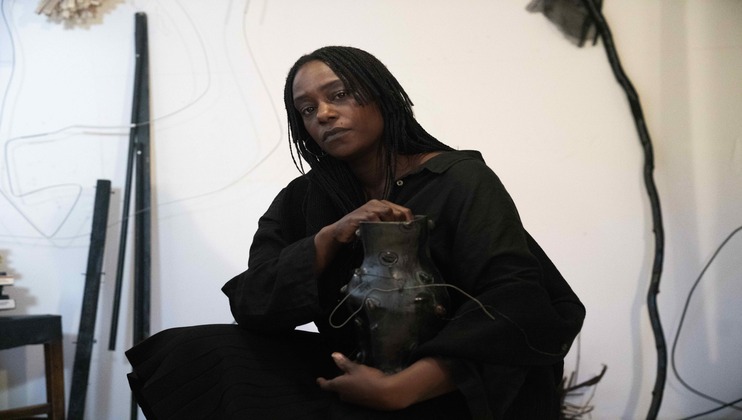REBECCA BELLANTONI
First institutional solo exhibition - 'Day and heavy, Judah leaves'
This entry has expired.

This summer, De La Warr Pavilion will present the first institutional solo exhibition of London-based artist, Rebecca Bellantoni, comprising a new body of sculptural and installation work in the First floor gallery.
Working with moving image, installation, performance, photography, textiles, printmaking, sculpture, sound-text, and ceramics, Bellantoni (b. 1981, UK) draws from everyday occurrences and abstracts them. Through investigations into the layered lens and aesthetics of Black women’s writing (fiction and nonfiction), metaphysics, philosophy, religion, spirituality and geography, Bellantoni gently prises apart the concept of the accepted/expected ‘real’ and the experiential ‘real’, looking at how these removed borders may offer meditative experiences and portals to the self, collective reasoning and healing thought and action.
For this new commission, Bellantoni will bring together a series of sculptural and installation works comprising ceramic, textile, wood, sound, photography and found objects. Together, they tell the story of the intergenerational relationship between the artist, her Godmother and the latter’s self-initiated exodus back to Jamaica in the late 1980s.
Shifting between the personal and the archetypal, Bellantoni’s exhibition charts the course of The Godmother and The Child through geographical mapping, picturing various energy fields created between these two characters. As in much of the artist’s work, London is a central topographical and subterranean character, an urban space in which time and memory layer and resonate throughout generations of people living in this urban context.
For Day and heavy, Judah leaves, Bellantoni draws from Katherine McKittrick’s exploration of the geographic lives of Black women, who despite being considered ‘ungeographic’ – through a history of displacement – continue to claim and build, Bellantoni has taken this provocation to heart by creating an intimate environment charting the unassuming relationship between a working-class woman and her godchild, and the potential for the mystical to reveal itself in the everyday.
Further Information: Rebecca Bellantoni: Day and heavy, Judah leaves
Venue details
- Address:
- De La Warr Pavilion
- Marina
- East Sussex
- TN40 1DP